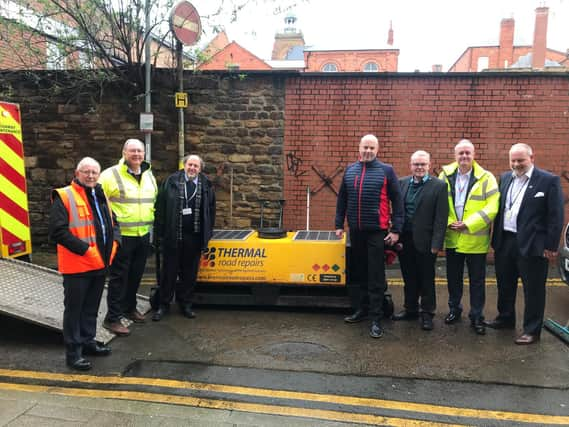Council says Northamptonshire's pot hole repair rate should triple with new thermal method


Northamptonshire County Council is shaking up the way it fixes potholes on the county’s roads in a bid to speed up repairs and reduce costs.
The council’s cabinet is expected to approve a bid next week for £654,000 of capital investment so the authority can buy some new machinery to enable its highways contractor to move away from traditional methods and introduce a new thermal patching process which should triple the speed of repairs.
Advertisement
Hide AdAdvertisement
Hide AdThe plan is to buy two thermal patching machines and also invest in a roadmaster jet machine to speed up the rate of repairs on the county’s rural road network. When the two new unitary councils come into force in April 2021 the machinery will be transferred to the new authorities.
County Council cabinet member for place, highways and the environment Cllr Jason Smithers said: “We know that a good road system is a priority for the people of the county and we are delighted to have the opportunity to buy the technology to make this happen.
“The easing of the county council’s financial constraints – through good budget management – has allowed this ‘invest to save’ project to take place and we are certain investment in the new technology will bring long-term financial benefits.
“As well as an increase in the quantity of road repairs there will also be an increase in the quality, as the road repair system will be much more efficient.”
Advertisement
Hide AdAdvertisement
Hide AdCurrently the council’s highways contractor KierWSP uses a hand-dig and fill method which, a business case report to go before the cabinet says, costs £1,017 per day, involves disposing of waste material and fills just 16sq m of road.
The new thermal method works by melting the existing poor road surface and producing a permanent, heat-sealed, “seamless” repair which re-establishes the original quality of the road.
The report says the a new 2x1m patch takes around 8 to 12 minutes to complete and requires only a minimum amount of new material, resulting in almost zero waste. Patches can also be joined together to repair larger areas of failed surfacing. In total 50sq m can be repaired per day for a cost of £1,086.
KierWSP currently hires a roadmaster for two months of the year. This method involves jet patching repairs, but the repairs are not as long lasting as the thermal method.
Advertisement
Hide AdAdvertisement
Hide AdIf the council buys the equipment it can be used year round and the business case says it can repair 120sq m of road per day at a cost of £2,139.
The business case says: “The current pothole repair output is 14,960sq m per year. This output figure is insufficient to keep pace with the occurrence of potholes in the road and there is a desire to increase the output by carrying out the work in a more economical way rather than output remaining static for a reduced cost.”
The new machinery has already been trialled in Wellingborough and East Northants and is scheduled to begin work in other areas in March.
Last week a mega pothole on the A43 in Corby damaged three cars in the space of a few hours. The authority paid out £195,000 in 2018 to road users whose vehicles had been damaged by potholes on Northants roads.